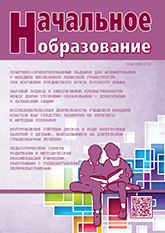Russian Federation
The most important theoretical and methodological issues related to the identification, assessment, formation and development of the teacher’s psychological and pedagogical potential include adequate methods of his psychodiagnostics. Until now, almost all diagnostic methods used in psychology, including pedagogical, were focused mainly on assessing the current professional level of a specialist’s development, and his potential psychological and pedagogical capabilities, which were not manifested or were not clearly manifested in practical activity, was considered rather within the framework of theory. The article offers for discussion a number of tasks that require methodological and methodological solutions, and are aimed at studying the psychological and pedagogical potential of the teacher.
research of the qualities of the teacher’s personality; traditional methods of psychodiagnostics; orientation towards identifying the current level of the teacher’s psychological and pedagogical properties; a new approach to the methodological and methodological foundations of psychodiagnostics; determination of the psychological and pedagogical potential of the teacher
1. Voropaev M.V. Vospitanie v virtual'nykh sredakh [Education in virtual environments]. Moscow: Moskovskii pedagogicheskiy gosudarstvennyi universitet Publ., 2010. 231 p. EDN: https://elibrary.ru/QZCCJZ
2. Derkach A.A. Akmeologicheskie rezervy razvitiya tvorcheskogo potentsiala lichnosti [Acmeological reserves for the development of a person's creative potential]. Moscow: Rossiyskaya akademiya gosudarstvennoy sluzhby Publ., 2001. 538 p.
3. Savenkov A.I. Potentsial lichnosti: Antropologicheskiy, deyatel'nostnyy i kul'turologicheskiy podkhody [Personality potential: Anthropological, activity and cultural approaches]. Tezaurus [Thesaurus]. 2005, I. 5 (24), 182 p.
4. Savenkov A.I., Romanova M.A. Osnovnye faktory razvitiya intellektual'no-tvorcheskogo potentsiala lichnosti [The main factors in the development of the intellectual and creative potential of the individual]. Vestnik Tambovskogo universiteta. Seriya: «Gumanitarnye nauki» [Bulletin of the Tambov University. Series: "Humanities"]. 2009, I. 7 (75), pp. 234-238. EDN: https://elibrary.ru/KYRNHD
5. Romanova M.A. Traditsionnye podkhody k kognitivnomu razvitiyu [Traditional approaches to cognitive development]. Sibirskiy pedagogicheskiy zhurnal [Siberian Pedagogical Journal]. 2008, I. 4, pp. 306-311. EDN: https://elibrary.ru/PFSPKV
6. Renzulli J.S. The three-ring conception of giftedness: A developmental model for creative productivity // Sternberg R.J., Davidson J.E. (Eds.). Conceptions of Giftedness. - New York: Cambridge University Press. 1986. - 357 p.






